- Download Price:
- Free
- Size:
- 0.02 MB
- Operating Systems:
- Directory:
- N
- Downloads:
- 672 times.
What is Npfsc32.dll?
The Npfsc32.dll file is 0.02 MB. The download links for this file are clean and no user has given any negative feedback. From the time it was offered for download, it has been downloaded 672 times.
Table of Contents
- What is Npfsc32.dll?
- Operating Systems That Can Use the Npfsc32.dll File
- How to Download Npfsc32.dll File?
- Methods to Solve the Npfsc32.dll Errors
- Method 1: Installing the Npfsc32.dll File to the Windows System Folder
- Method 2: Copying The Npfsc32.dll File Into The Software File Folder
- Method 3: Doing a Clean Install of the software That Is Giving the Npfsc32.dll Error
- Method 4: Solving the Npfsc32.dll error with the Windows System File Checker
- Method 5: Fixing the Npfsc32.dll Errors by Manually Updating Windows
- Common Npfsc32.dll Errors
- Dll Files Similar to the Npfsc32.dll File
Operating Systems That Can Use the Npfsc32.dll File
How to Download Npfsc32.dll File?
- First, click on the green-colored "Download" button in the top left section of this page (The button that is marked in the picture).
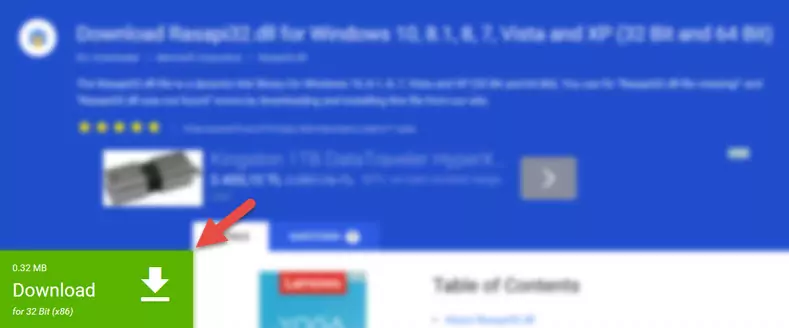
Step 1:Start downloading the Npfsc32.dll file - The downloading page will open after clicking the Download button. After the page opens, in order to download the Npfsc32.dll file the best server will be found and the download process will begin within a few seconds. In the meantime, you shouldn't close the page.
Methods to Solve the Npfsc32.dll Errors
ATTENTION! Before beginning the installation of the Npfsc32.dll file, you must download the file. If you don't know how to download the file or if you are having a problem while downloading, you can look at our download guide a few lines above.
Method 1: Installing the Npfsc32.dll File to the Windows System Folder
- The file you downloaded is a compressed file with the ".zip" extension. In order to install it, first, double-click the ".zip" file and open the file. You will see the file named "Npfsc32.dll" in the window that opens up. This is the file you need to install. Drag this file to the desktop with your mouse's left button.
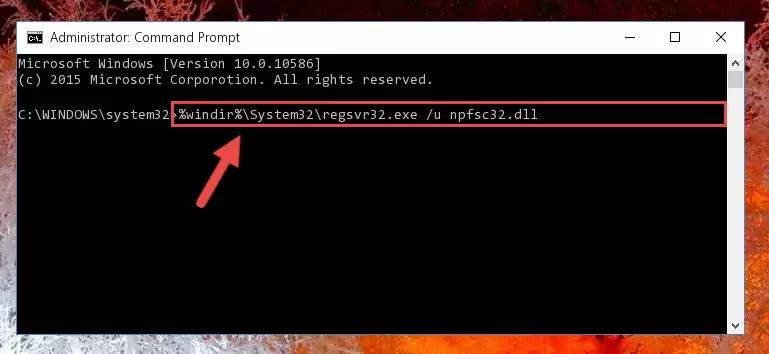
Step 1:Extracting the Npfsc32.dll file - Copy the "Npfsc32.dll" file and paste it into the "C:\Windows\System32" folder.
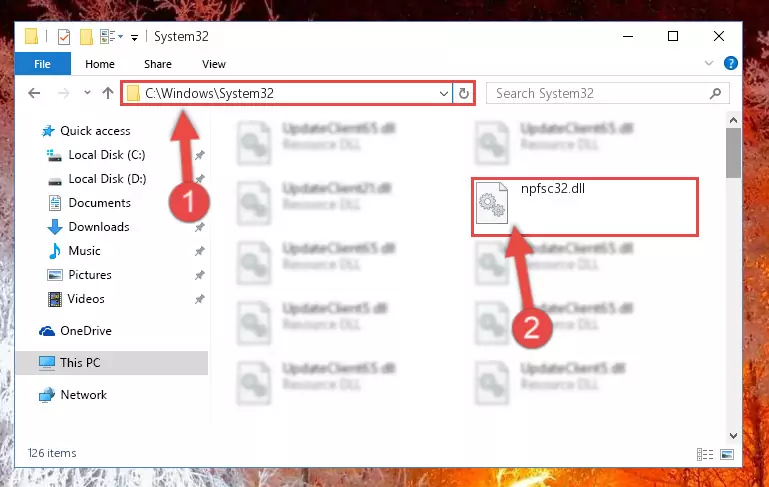
Step 2:Copying the Npfsc32.dll file into the Windows/System32 folder - If your operating system has a 64 Bit architecture, copy the "Npfsc32.dll" file and paste it also into the "C:\Windows\sysWOW64" folder.
NOTE! On 64 Bit systems, the dll file must be in both the "sysWOW64" folder as well as the "System32" folder. In other words, you must copy the "Npfsc32.dll" file into both folders.
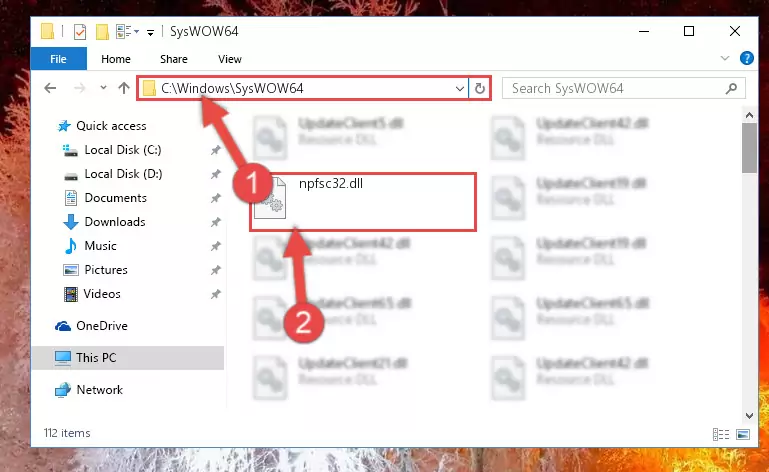
Step 3:Pasting the Npfsc32.dll file into the Windows/sysWOW64 folder - First, we must run the Windows Command Prompt as an administrator.
NOTE! We ran the Command Prompt on Windows 10. If you are using Windows 8.1, Windows 8, Windows 7, Windows Vista or Windows XP, you can use the same methods to run the Command Prompt as an administrator.
- Open the Start Menu and type in "cmd", but don't press Enter. Doing this, you will have run a search of your computer through the Start Menu. In other words, typing in "cmd" we did a search for the Command Prompt.
- When you see the "Command Prompt" option among the search results, push the "CTRL" + "SHIFT" + "ENTER " keys on your keyboard.
- A verification window will pop up asking, "Do you want to run the Command Prompt as with administrative permission?" Approve this action by saying, "Yes".
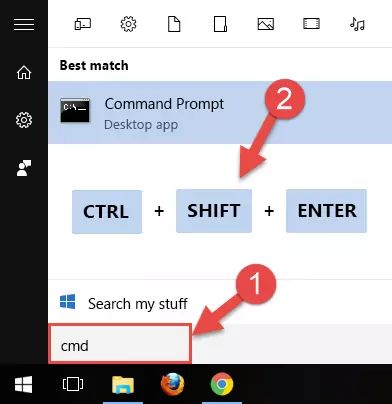
%windir%\System32\regsvr32.exe /u Npfsc32.dll
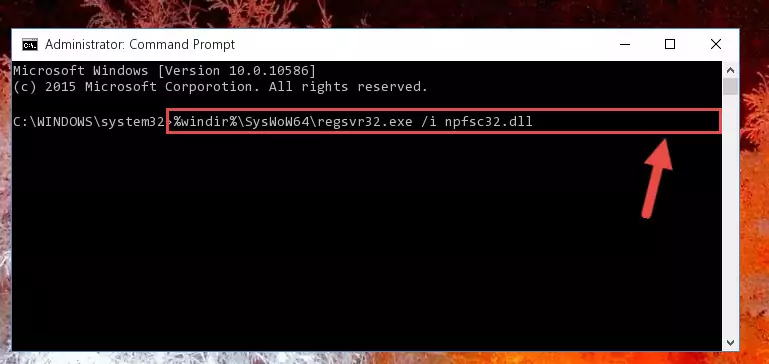
%windir%\SysWoW64\regsvr32.exe /u Npfsc32.dll
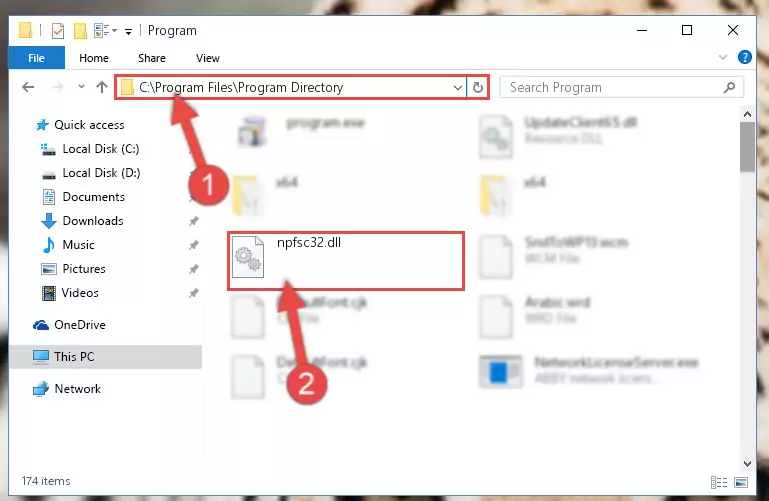
%windir%\System32\regsvr32.exe /i Npfsc32.dll
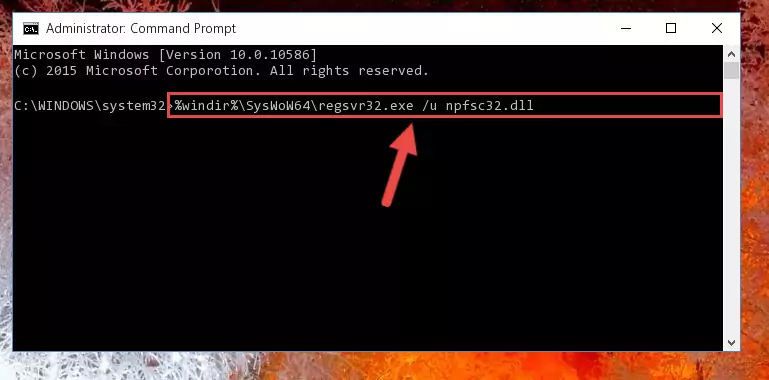
%windir%\SysWoW64\regsvr32.exe /i Npfsc32.dll
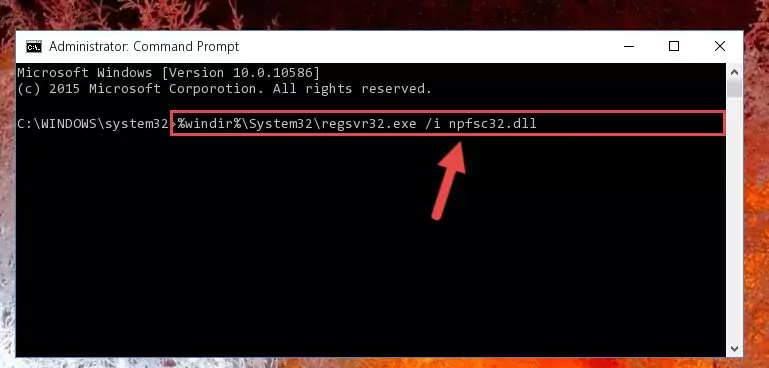
Method 2: Copying The Npfsc32.dll File Into The Software File Folder
- First, you must find the installation folder of the software (the software giving the dll error) you are going to install the dll file to. In order to find this folder, "Right-Click > Properties" on the software's shortcut.
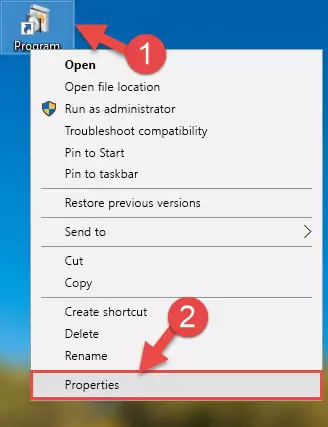
Step 1:Opening the software's shortcut properties window - Open the software file folder by clicking the Open File Location button in the "Properties" window that comes up.
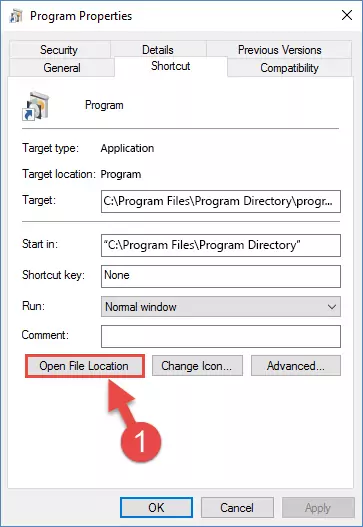
Step 2:Finding the software's file folder - Copy the Npfsc32.dll file.
- Paste the dll file you copied into the software's file folder that we just opened.
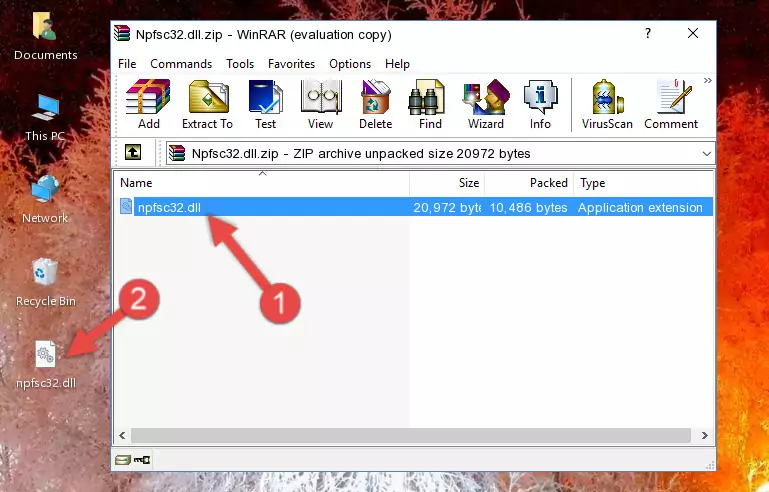
Step 3:Pasting the Npfsc32.dll file into the software's file folder - When the dll file is moved to the software file folder, it means that the process is completed. Check to see if the problem was solved by running the software giving the error message again. If you are still receiving the error message, you can complete the 3rd Method as an alternative.
Method 3: Doing a Clean Install of the software That Is Giving the Npfsc32.dll Error
- Press the "Windows" + "R" keys at the same time to open the Run tool. Paste the command below into the text field titled "Open" in the Run window that opens and press the Enter key on your keyboard. This command will open the "Programs and Features" tool.
appwiz.cpl
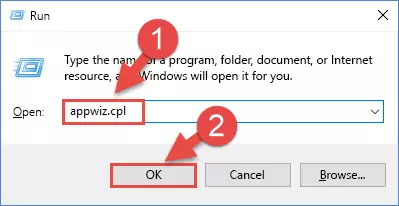
Step 1:Opening the Programs and Features tool with the Appwiz.cpl command - The Programs and Features screen will come up. You can see all the softwares installed on your computer in the list on this screen. Find the software giving you the dll error in the list and right-click it. Click the "Uninstall" item in the right-click menu that appears and begin the uninstall process.
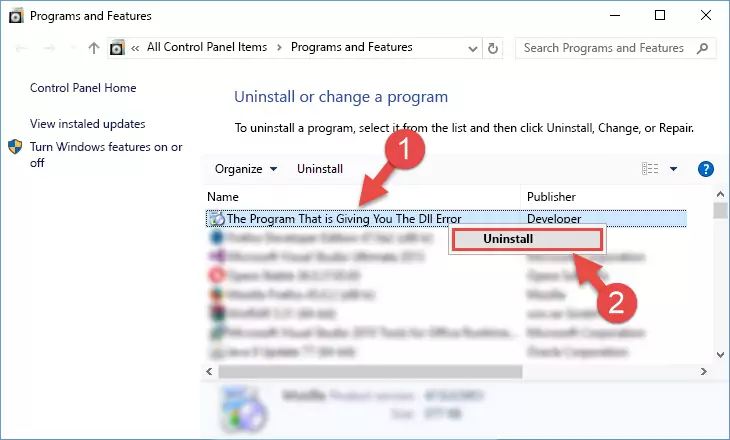
Step 2:Starting the uninstall process for the software that is giving the error - A window will open up asking whether to confirm or deny the uninstall process for the software. Confirm the process and wait for the uninstall process to finish. Restart your computer after the software has been uninstalled from your computer.
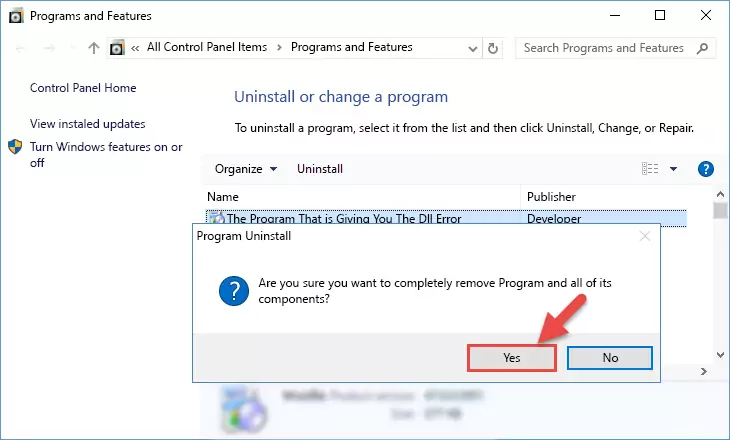
Step 3:Confirming the removal of the software - After restarting your computer, reinstall the software that was giving the error.
- You may be able to solve the dll error you are experiencing by using this method. If the error messages are continuing despite all these processes, we may have a problem deriving from Windows. To solve dll errors deriving from Windows, you need to complete the 4th Method and the 5th Method in the list.
Method 4: Solving the Npfsc32.dll error with the Windows System File Checker
- First, we must run the Windows Command Prompt as an administrator.
NOTE! We ran the Command Prompt on Windows 10. If you are using Windows 8.1, Windows 8, Windows 7, Windows Vista or Windows XP, you can use the same methods to run the Command Prompt as an administrator.
- Open the Start Menu and type in "cmd", but don't press Enter. Doing this, you will have run a search of your computer through the Start Menu. In other words, typing in "cmd" we did a search for the Command Prompt.
- When you see the "Command Prompt" option among the search results, push the "CTRL" + "SHIFT" + "ENTER " keys on your keyboard.
- A verification window will pop up asking, "Do you want to run the Command Prompt as with administrative permission?" Approve this action by saying, "Yes".

sfc /scannow
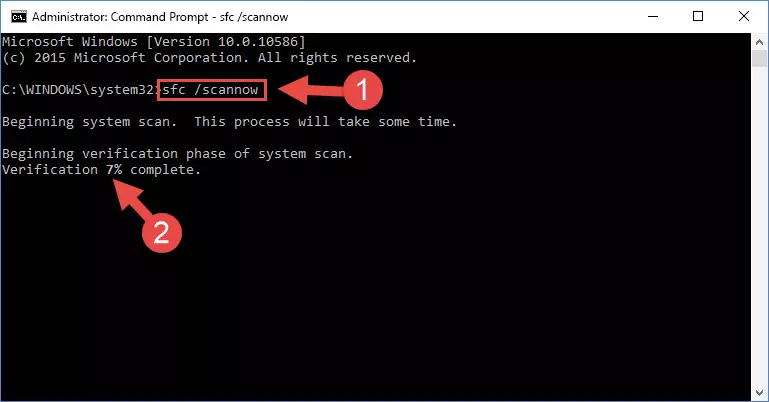
Method 5: Fixing the Npfsc32.dll Errors by Manually Updating Windows
Most of the time, softwares have been programmed to use the most recent dll files. If your operating system is not updated, these files cannot be provided and dll errors appear. So, we will try to solve the dll errors by updating the operating system.
Since the methods to update Windows versions are different from each other, we found it appropriate to prepare a separate article for each Windows version. You can get our update article that relates to your operating system version by using the links below.
Explanations on Updating Windows Manually
Common Npfsc32.dll Errors
It's possible that during the softwares' installation or while using them, the Npfsc32.dll file was damaged or deleted. You can generally see error messages listed below or similar ones in situations like this.
These errors we see are not unsolvable. If you've also received an error message like this, first you must download the Npfsc32.dll file by clicking the "Download" button in this page's top section. After downloading the file, you should install the file and complete the solution methods explained a little bit above on this page and mount it in Windows. If you do not have a hardware problem, one of the methods explained in this article will solve your problem.
- "Npfsc32.dll not found." error
- "The file Npfsc32.dll is missing." error
- "Npfsc32.dll access violation." error
- "Cannot register Npfsc32.dll." error
- "Cannot find Npfsc32.dll." error
- "This application failed to start because Npfsc32.dll was not found. Re-installing the application may fix this problem." error
